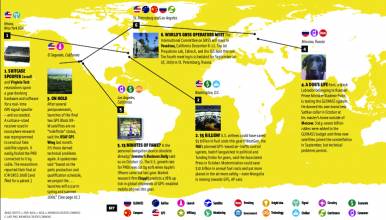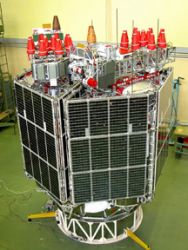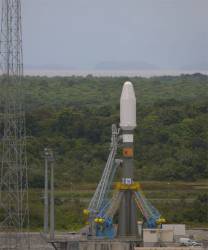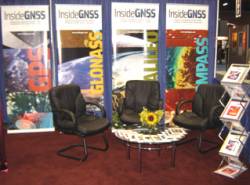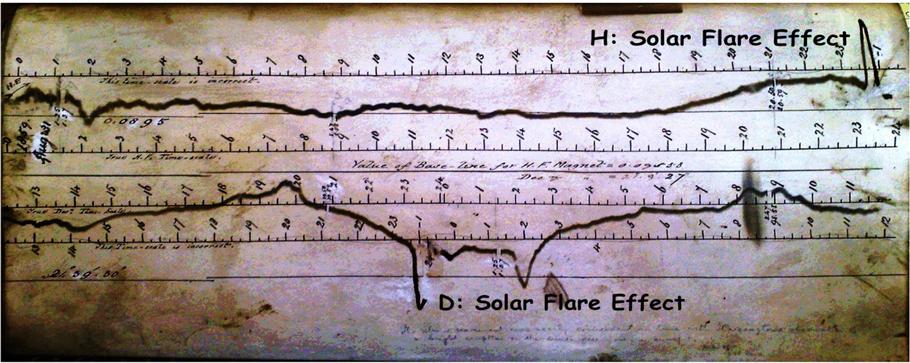 One of 12 magnetograms recorded at Greenwich Observatory during the Great Geomagnetic Storm of 1859
One of 12 magnetograms recorded at Greenwich Observatory during the Great Geomagnetic Storm of 1859 1996 soccer game in the Midwest, (Rick Dikeman image)
1996 soccer game in the Midwest, (Rick Dikeman image)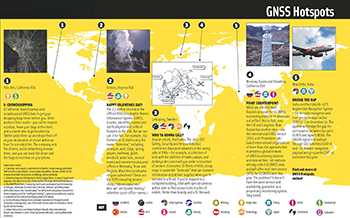
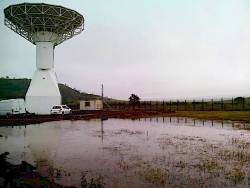 Nouméa ground station after the flood
Nouméa ground station after the flood A pencil and a coffee cup show the size of NASA’s teeny tiny PhoneSat
A pencil and a coffee cup show the size of NASA’s teeny tiny PhoneSat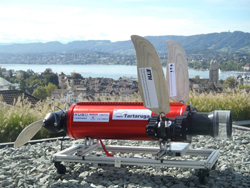 Bonus Hotspot: Naro Tartaruga AUV
Bonus Hotspot: Naro Tartaruga AUV
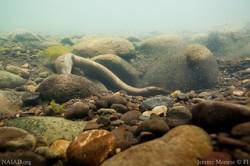 Pacific lamprey spawning (photo by Jeremy Monroe, Fresh Waters Illustrated)
Pacific lamprey spawning (photo by Jeremy Monroe, Fresh Waters Illustrated) “Return of the Bucentaurn to the Molo on Ascension Day”, by (Giovanni Antonio Canal) Canaletto
“Return of the Bucentaurn to the Molo on Ascension Day”, by (Giovanni Antonio Canal) Canaletto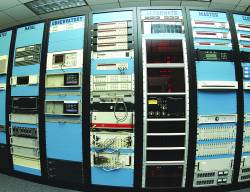 The U.S. Naval Observatory Alternate Master Clock at 2nd Space Operations Squadron, Schriever AFB in Colorado. This photo was taken in January, 2006 during the addition of a leap second. The USNO master clocks control GPS timing. They are accurate to within one second every 20 million years (Satellites are so picky! Humans, on the other hand, just want to know if we’re too late for lunch) USAF photo by A1C Jason Ridder.
The U.S. Naval Observatory Alternate Master Clock at 2nd Space Operations Squadron, Schriever AFB in Colorado. This photo was taken in January, 2006 during the addition of a leap second. The USNO master clocks control GPS timing. They are accurate to within one second every 20 million years (Satellites are so picky! Humans, on the other hand, just want to know if we’re too late for lunch) USAF photo by A1C Jason Ridder. 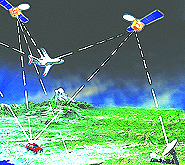 Detail of Compass/ BeiDou2 system diagram
Detail of Compass/ BeiDou2 system diagram Hotspot 6: Beluga A300 600ST
Hotspot 6: Beluga A300 600ST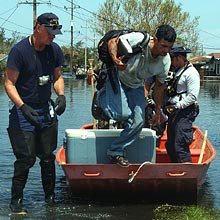

1. GOOD-BYE DELTA II
. . . It’s been good to know you!
Cape Canaveral, Florida USA
√ The last of eight modernized GPS IIR-2R (M) satellites is in its place in the constellation, carried to its spot on August 17 by the last of the U.S. Air Force’s United Launch Alliance Delta II rockets. For 21 years, they’ve been the GPS ride.
1. GOOD-BYE DELTA II
. . . It’s been good to know you!
Cape Canaveral, Florida USA
√ The last of eight modernized GPS IIR-2R (M) satellites is in its place in the constellation, carried to its spot on August 17 by the last of the U.S. Air Force’s United Launch Alliance Delta II rockets. For 21 years, they’ve been the GPS ride.
2. ON TENTERHOOKS
Portland, Maine USA and Washington, D.C.
√ The 38th International Loran Conference will take place in Portland, Maine, USA October 13-15. Loran-C is funded through January 4, 2010. The transition to eLoran as a backup to GPS, which is about 70% completed, is still up in the air. Multiple bills in the U.S. House and Senate are in the works. (See October 21 Inside GNSS news update on Loran.)
3. INTERSECTIONS EVERYWHERE
SE of Los Barrios, Jaén, Andalusía, Spain
√ With 10,622 locations to go, Confluence Degree Project explorers seek a photographic record of each latitude and longitude integer-degree intersection (not counting oceans or poles). Take your bearings with your feet on the ground within 100 meters of a WGS84 graticule confluence, click the shutter, and post to www.confluence.org
4. FREE! ACCURATE! RELIABLE!
EGNOS Control Center, Ciampino, Italy
√ Europeans with GPS/SBAS-equipped receivers are set to enjoy a new free, strong open signal service starting in October, courtesy of EGNOS, the European Geostationary Overlay Service. This precursor to Galileo is accurate to 1-3 meters 99% of the time and it’s going to get even better, says the European Commission.(See related October 1 Inside GNSS news story)
5. SET TO GO
Baikonur Cosmodrome, Kazakh Desert
√ Three GLONASS-M satellites will launch from Baikonur Cosmodrome on September 25, with three more scheduled to go up around Christmastime. The Russian GNSS program is humming right along, with plans to build a space-based augmentation system and ground-monitoring stations in Australia, Cuba and South America, the first outside Russian territory. (Read the September 30 Inside GNSS story about launch delay)
6. COMPASS AND GALILEO
Beijing, China and Brussels, Belgium
√ China announced new GNSS signal and frequency plans at an ICG working group meeting in July. They’ll move more signals into the BOC family, which still overlays most of GPS/Galileo MBOC signals. . . . Overlapping authorized signals and frequencies are unavoidable, China representative Yuanxi Yang said. (See related October 5 Inside GNSS news story)

